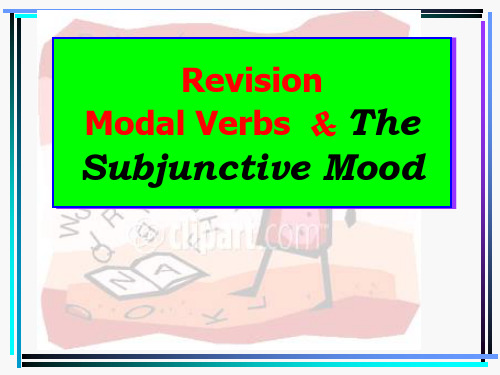专题八 情态动词和虚拟语气.pptx
合集下载
虚拟语气(19张PPT)初中英语专项复习课件

My idea is that we (should ) think it over before accepting it.
My suggestion that we (should) have a meeting has been accepted by others.
We all agree to that suggestion that the meeting (should) be put off.
If I had known his telephone number, I would have called him. 如果明天下雨的话,我们会取消比赛.
If it should \were to rain, we would call off the match.
使用虚拟条件句要注意的几点:
China.
A.would be B. has been C. should be D.was
5. He is talking so much about America as if he ___A__ there.
A.had been
B. has been
C. was
D. has gone
6. The young man insisted that he __B___ nothing
I would rather you told me the truth. I would rather you had gone there last Sunday.
4. as if ( as though) 看起来 常用虚拟形式,即 表示与现在事实相反,用过去式;与过去事实相反 用过去完成式 (had done).
虚拟语气
初中英语专项复习
My suggestion that we (should) have a meeting has been accepted by others.
We all agree to that suggestion that the meeting (should) be put off.
If I had known his telephone number, I would have called him. 如果明天下雨的话,我们会取消比赛.
If it should \were to rain, we would call off the match.
使用虚拟条件句要注意的几点:
China.
A.would be B. has been C. should be D.was
5. He is talking so much about America as if he ___A__ there.
A.had been
B. has been
C. was
D. has gone
6. The young man insisted that he __B___ nothing
I would rather you told me the truth. I would rather you had gone there last Sunday.
4. as if ( as though) 看起来 常用虚拟形式,即 表示与现在事实相反,用过去式;与过去事实相反 用过去完成式 (had done).
虚拟语气
初中英语专项复习
英语专题情态动词和虚拟语气ppt课件

共 56 页
1
认识到了贫困户贫困的根本原因,才 能开始 对症下 药,然 后药到 病除。 近年来 国家对 扶贫工 作高度 重视, 已经展 开了“ 精准扶 贫”项 目
2.must 和 have to must 和 have to 都可以表示“必须”,但有几点区别: (1)must 强调“内在的职责”、“义务”,而 have to 强调 “外界压力”、“不得已而为之”。 (2)have to 可用于多种时态,而 must 一般用于现在时,其过 去时与将来时分别由 had to 与 shall/will have to 代替。 例如:1)You must come to the classroom before eight.
He must have been to school共, h56a页sn’t he?
3
认识到了贫困户贫困的根本原因,才 能开始 对症下 药,然 后药到 病除。 近年来 国家对 扶贫工 作高度 重视, 已经展 开了“ 精准扶 贫”项 目
3.used to+do,be used to+doing 和 be used to+do (1)used to+do意为“过去常常做某事”,“过去一直做某 事”;be used to+v. ing/n.意为“习惯于”;be used to+do 意为“被用来做某事”。 (2)used to 只表示过去,而 be used to+v. ing/n.可表示现在、 过去或将来。例如: 1)He used to smoke.Now he doesn't. 2)He's quite used to hard work/working hard. 3)The knife is used to cut bread.
共 56 页
高考英语一轮复习:高考语法专题8情态动词与虚拟语气(共70张PPT

(3)may 肯定句、否定句。 That may be so,but I doubt it. 也许是这样,但我表示怀疑。 may have done. 可能做过。 may not have done. 可能未做过。
It may not have been my mistake. 也许不是我的错。 He may have arrived in Shanghai. 他可能已经到达上海了。
—Must I finish my homework at once? 我必须马上完成作业吗? —Yes,you must. 必须。 —No,you needn't/you don't have to. 不必。
(2)mustn't 绝对不可,不许 You mustn't lend it to others. 你不能把它借给别人。 I must not let anyone know. 我不能让任何人知If he says he'll come,he will. 他说来他就会来。 You will be glad to see her. 见到她你会很高兴。 Fish will die without water. 鱼没有水会死的。
8.would 是 will 的过去式 (1)愿望 “I would do anything for our soldiers.”said the old lady. “我愿意为战士做任何事”,老大妈说。
二、虚拟语气 1.虚拟语气与陈述语气的区别: (1)意义不同。 陈述语气表示动词或状态是现实的, 确实的或符合 事实的,而虚拟语气表示动作状态不是事实,而是说话 人的主观愿望、假设、建议或推测等。
(2)形式不同。 虚拟语气的谓语动词形式和陈述语气的谓语动词 形式不同, 如虚拟条件句的谓语和真实条件句的谓语就 截然不同。如: If it rains tomorrow,our picnic will be put off. 如果明天下雨,我们的郊游就推迟。 (陈述语气, 说话人认为下雨的可能性很大。) If it rained tomorrow,our picnic would be put off. 万一明天下雨,我们的郊游就推迟。 (虚拟语气, 说话人认为下雨的可能性较小。)
初中英语 情态动词和虚拟语气 课件

(3)表示与将来事实相反的假设,条件状语从句中的谓语动词用一般过去时或 “should/were to+动词原形”,而主句中的谓语动词则用“would/should/ could/might+动词原形”。 If it rained/should rain/were to rain tomorrow,the football match would be put off. (4)当条件状语从句表示的行为和主句表示的行为所发生的时间不一致时,动 词的形式要根据它所表示的时间作相应调整。 If they had worked hard,they would be very tired now.(从句说的是过去,主 句指的是现在)
Grammar
词法篇——动词
动词的时态和语态 非谓语动词 情态动词和虚拟语气
情态动词和虚拟语气
PART 1 高频考点清单 PART 2 重温高考真题 PART 3 热考点集训 PART 4 综合演练
PART 1
高频考点清单
框架结构图
情态动词的核心考点
1.can/could和be able to的用法 (1)can和be able to都表示能力,意思上没多大区别。但can只有现在和过去时, 而be able to则有更多的形式。但当成功地完成某一具体动作时,通常不用 could而用was/were able to来表示。这时was/were able to 相当于managed to, 表示经过一番努力,终于能够完成某事。 Her mother can speak French. The wounded man was still able to get to the village and was saved by the villagers in the end.
情态动词和虚拟语气课件

C
核心 考点
解读
考点一
情态动词
-Do you know where David is?I couldn't find him anywhere. -Well.He can't have gone far-his coat's still here. ——你知道大卫在哪里吗?我到处找不到他。 ——大卫的上衣还在这里,因此他肯定没走远。 I could have saved the poor rabbit,but I didn't have the right drugs with me at that moment.我本来可以拯救那只可怜的兔子的,可是我当时没 有合适的药品。
C
核心 考点
解读
考点一
情态动词
2.情态动词+have done的用法 (1)表示“后怕、责备或遗憾”
C
核心 考点
解读
考点一
情态动词
2.情态动词+have done的用法 (1)表示“后怕、责备或遗憾”
1 should/ought to have done could have done might have done could not have done might not have done needn't have done 原本应该做„„(但未做到) 原本能做/可能做过 可能做过 原本不能/一定不会做过 可能没做过 原本不必做
C
核心 考点
解读
考点一
情态动词
用法
情态动词 will would dare ①意愿,决心
②请求,建议,用在问句时would比较委婉 ③表示习惯 敢(常用于否定句和疑问句中) 需要,必须(常用于否定句和疑问句中) need 点津 当need用于疑问句时,其肯定回答是: Yes,...must. used to 过去常常(现在已不再)
情态动词和虚拟语气

Should I be free tomorrow, I’ll come.
If things should change suddenly, please let me k用n于owIf.从句中表示可能性很小的事情,译为“万一” Why should you be so late today? “Why/ How+should”表示说话人对某事不能理
2.The rules shall take effect on Jan. 1st. 3.“The interest shall be divided into five
parts, according to the agreement made by both sides.” declared the judge.
You shall have the book when I finished it.
He shall be punished.
You shall be punished if you insist on doing it this way.
用于第二,三人称陈述句中表 命令,警告,允诺或威胁
1.Each member shall wear a name card.
情态动词主要有:
can, could, may, might, must, ought to, shall, should, will, would, need, dare,had better, etc.
1. can和could
1.Some of us can use the computer now, but we couldn’t last ye表ar示. “能力”
考点一 情态动词的基本用法
1) 情态动词不能表示正在发生或已经发 生的事情,只表示期待或估计某事的发生 2) 情态动词 除ought 和have 外,后面 只能接不带to 的不定式。 3) 情态动词没有人称,数的变化,即情 态动词第三人称单数不加-s。 4) 情态动词没有非谓语形式,即没有不 定式,分词等形式。
If things should change suddenly, please let me k用n于owIf.从句中表示可能性很小的事情,译为“万一” Why should you be so late today? “Why/ How+should”表示说话人对某事不能理
2.The rules shall take effect on Jan. 1st. 3.“The interest shall be divided into five
parts, according to the agreement made by both sides.” declared the judge.
You shall have the book when I finished it.
He shall be punished.
You shall be punished if you insist on doing it this way.
用于第二,三人称陈述句中表 命令,警告,允诺或威胁
1.Each member shall wear a name card.
情态动词主要有:
can, could, may, might, must, ought to, shall, should, will, would, need, dare,had better, etc.
1. can和could
1.Some of us can use the computer now, but we couldn’t last ye表ar示. “能力”
考点一 情态动词的基本用法
1) 情态动词不能表示正在发生或已经发 生的事情,只表示期待或估计某事的发生 2) 情态动词 除ought 和have 外,后面 只能接不带to 的不定式。 3) 情态动词没有人称,数的变化,即情 态动词第三人称单数不加-s。 4) 情态动词没有非谓语形式,即没有不 定式,分词等形式。
高考英语情态动词与虚拟语气PPT课件
【11福建,25】——Shall I inform him of the change of the schedule right now? ——I am afraid you , in case he comes late for the meeting . A. will B. must C. may D. can 【11福建,34】——Pity you missed the lecture on nuclear pollution. ——I it, but I was busy preparing for a job interview. A. attended B. had attended C. would attend D. would have attended 【11安徽, 26】——What do you think of store shopping in the future? ——Personally, I think it will exist along with home shopping but _____. A. will never replace B. would never replace C. will never be replaced D. would never be replaced 【11浙江,11】——How’s your new babysitter? ——We ________ask for a better one. All our kids love her so much. A. should B. might C. mustn‘t D. couldn’t
A. must not B. need not C. would not D. might not
【2011北京,28】——Where are the children? The
